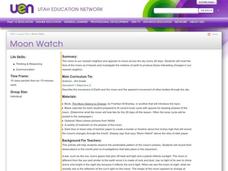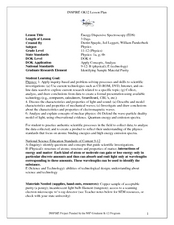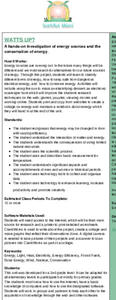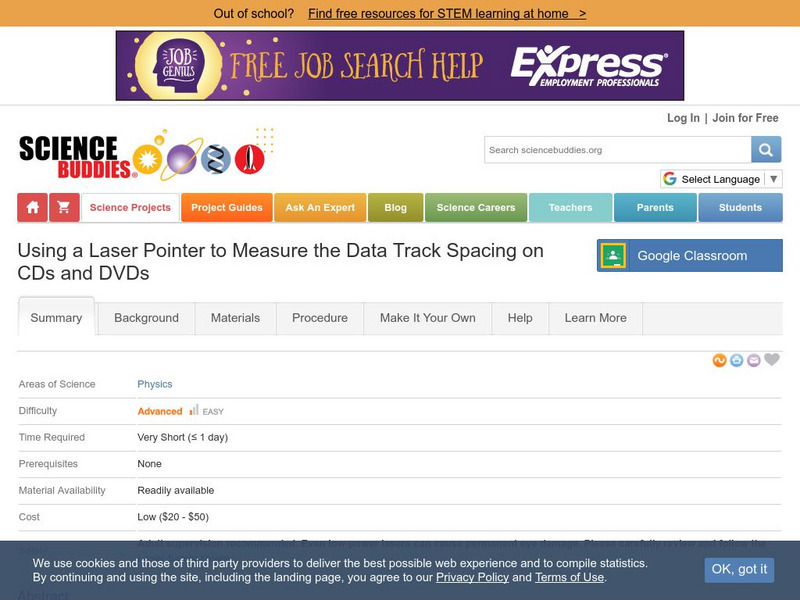Curated OER
Sea Turtle Savvy
Students explore sea turtles. They create paper plate sea turtles and brainstorm other organisms that live in the sea turtle's habitat. They role-play scenes from a nonfiction book, A Baby Sea Turtle's Journey. They play a game...
Curated OER
Let's Party!
First graders identify similarities/differences of celebrations and list ways to celebrate. They investigate celebrations from around the world.
Curated OER
Heating the Atmosphere
Students construct a thermograph for maximum and minimum temperatures for the 2-week period. They illustrate how the earth's atmosphere is heated by convection and conduction currents and evaporation of water.
Curated OER
All The News
Students simulate newspaper critics in the topics of heat and temperature. They write a scientific critique of evidence and claims used in a newspaper article and research using KIE software. They write notes on the letter to the editor...
Curated OER
Moon Watch
Third graders read books about the moon and discuss its perceived changes as it moves across the sky. They observe the moon over the course of a month and chart their observations. They discuss their observations and conduct further...
Curated OER
How Hot Is It?
Sixth graders use paper cups, black and white lining, thermometers and plastic wrap to conduct an experiment that measures the energy-collecting capacity of various colors. They graph the results.
Curated OER
Energy Dispersive Spectroscopy
Students calculate the values of electron binding energies. In this physics instructional activity, students solve for different wavelength characteristics of X-rays. They present their findings to the class.
Curated OER
WATTS UP?
Second graders research the Internet as they classify different forms of energy, investigate electrical energy and how to conserve energy.
Curated OER
Moon WebQuest
Third graders research basic information about the moon and identify the phases and order of the phases of the moon. They conduct Internet research, complete a moon WebQuest, and write a magazine article about the moon using their...
Curated OER
Automated Vehicle Programming Design
Students design a program to make an automated vehicle perform a specific task. In this robotics lesson, students play the role of scientists competing to win a factory's contract. They present their algorithm to class.
Curated OER
Altering Climate in the Classroom
Students experiment with moderating temperature extremes in the classroom. They experiment with ways to vent and block air.
Curated OER
Definition and Applications of Computational Science
Students participate in a variety of instructional experiences about Computer Science. They define Computational Science and describe computational simulation. They also compare and contrast Computational Science and Computer Science.
Curated OER
The Dot and Dashy Language
Young scholars examine and discuss the Morse Code. In small groups they develop messages using Morse code and take turns decipering the messages.
Curated OER
Clouds as Art: Torn Paper Landscape
Students create a torn paper landscape and use it to study clouds. In this cloud study and art lesson, students make a background art image from torn paper. Students create a torn paper landscape and use cotton balls to illustrate...
Alabama Learning Exchange
Alex: How Light Travels
In this lesson, the students will be experimenting to show how light shines in a straight line. They will also be experimenting to see how light reflects using mirrors. The students will be working in cooperative learning groups to carry...
Physics Classroom
The Physics Classroom: Reflection and Mirrors: Name That Image Interactive
Students participate in this skill-building activity where they explore how the location of an object in front of a curved mirror affects the characteristics of the projected image.
TeachEngineering
Teach Engineering: How Does a Light Sensor Work?
A mini-activity, which uses LEGO MINDSTORMS NXT intelligent bricks and light sensors gives students a chance to investigate how light sensors function in preparation for the associated activity involving the light sensors and taskbots.
TeachEngineering
Teach Engineering: Materials Properties Make a Difference
Students investigate the materials properties-such as acoustical absorptivity, light reflectivity, thermal conductivity, hardness, and water resistancea-of various materials. They use sound, light and temperature sensors to collect data...
Utah Education Network
Uen: I'm So Bright! I Wear My Shades Indoors!
This lesson engages students in learning about light through multiple sources. Students will learn how light is produced, reflected, refracted, and separated. Students will communicate their findings through an independent project that...
Science Buddies
Science Buddies: Using Laser Pointer to Measure Data Track Spacing on C Ds, Dv Ds
You've probably noticed the colorful patterns "reflecting" from the shiny surface of a CD disk. What you are seeing is actually diffraction of white light, and the rainbows of color are diffraction patterns. In this project you'll learn...
TeachEngineering
Teach Engineering: Construct It!
Students use simple household materials, such as PVC piping and compact mirrors, to construct models of laser-based security systems. The protected object (a "mummified troll" or another treasure of your choosing) is placed "on display"...
Boston University
Bu: Optics: Geometric Optics
Several short descriptions of demonstrations which illustrate principles of geometric optics (many of which focus upon refraction).
Other
University of Edinburgh: Glossary of Introductory Computer Graphics Terms
This website, from the University of Edinburgh, provides a lengthy glossary of computer graphics terms written by Olin Lathrop, author of "The Way Computer Graphics Work". This site provides simple definitions of basic terms; no graphics...

























